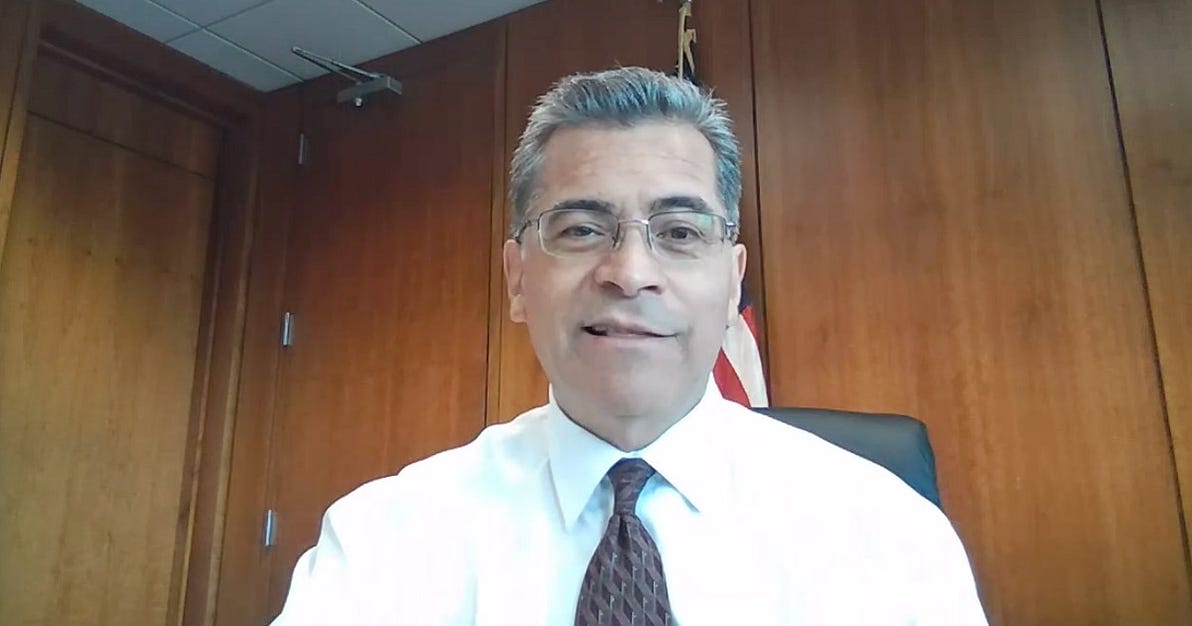Xavier Becerra said at the ONC annual meeting this week that establishing consequences for providers found to engage in information blocking is a “top HHS priority.”
Healthcare IT News
Kat Jercich
April 14, 2022
skedulo
U.S. Department of Health and Human Services Secretary Xavier Becerra said that the federal government has made “extraordinary progress” over the past year when it comes to advancing health technology.
Becerra pointed to the launch of TEFCA, enforcement of Cures Act provisions and the launch of Helios FHIR Accelerator as just a few examples.
… the federal government has made “extraordinary progress” over the past year when it comes to advancing health technology: (1) the launch of TEFCA, enforcement of Cures Act provisions and (2) the launch of Helios FHIR Accelerator as just a few examples.
At the same time, he said at the Office of the National Coordinator for Health IT Annual Meeting this week, the agency has several goals that have yet to be fulfilled.
Among them are what he referred to as the Cures Act penalty enforcement gap.
… the agency has several goals that have yet to be fulfilled, such as the Cures Act penalty enforcement gap.
Namely, as Becerra explained, civil monetary penalties for not complying with information-sharing requirements have only been established for technology developers and health information networks.
…civil monetary penalties for not complying with information-sharing requirements have only been established for technology developers and health information networks.
“It left the provider penalty up to me: the secretary of the Department of Health and Human Services,” he said.
This is an issue, he noted, because more than 75% of the complaints submitted to ONC have been about providers — and most have come from patients.
Information blocking, he said, leads to stress for patients and families, along with frustration for staff.
“That is not the kind of customer experience any of us should expect, certainly not in the 21st century, from our healthcare system,” he said.
This is an issue, he noted, because more than 75% of the complaints submitted to ONC have been about providers — and most have come from patients.
Put simply, he said, closing the enforcement gap is a “top HHS priority, and we are working hard on this issue right now.”
Put simply, he said, closing the enforcement gap is a “top HHS priority, and we are working hard on this issue right now.”
Another focus, he said, will be on health equity and public health, including via collaborative, participatory governance models.
He stressed the importance of what he called “health equity by design” at ONC, aimed at incorporating equity considerations into design, development, implementation and use.
This will include, at Becerra’s behest, a “deep look at algorithmic bias and its implications for health equity.”
Another focus, he said, will be on health equity and public health, including via collaborative, participatory governance models.
National Coordinator Micky Tripathi echoed this goal in his portion of the keynote.
He noted the importance of ensuring the availability of usable data, including information regarding disability status, sexual orientation and gender identity. Consistency in reporting of race, ethnicity and language, he said, will also be a focus.
“Appropriate use of that data to address inequities is hugely important as well,” he said.
“First you start with the data, and then you think about the uses of that data — how can that be used appropriately and effectively to not only make sure we’re not propagating or exacerbating problems that exist in the system, but ideally to help to rectify or mitigate some of those systems, using technology?” he added.
He flagged, too, the role that electronic health records can play in both sourcing data to train algorithms and in conveying the results of algorithms for clinicians.
“Every algorithm can be biased, and how do we think about that systematically?” he said.
He flagged, too, the role that electronic health records can play in both sourcing data to train algorithms and in conveying the results of algorithms for clinicians.
Lisa Lewis Person, deputy national coordinator, pointed out during the keynote that health IT cannot address all the societal and institutional factors that contribute to health inequities.
At the same time, she said, “It is vital that we mobilize health IT to identify and mitigate disparities where applicable.”
Overall, “the exciting and inspiring part is that we get to think about how we want to redesign the healthcare system without the constraints of paper, bricks and mortar,” said Tripathi.
“When I took this job 15 months ago, I promised a few things: to be strategic, to be practical, to be transparent, to be collaborative and to be impatient.
“I hope all of you who are critical stakeholders feel that I and ONC are delivering on all of those things,” he added.
Overall, “the exciting and inspiring part is that we get to think about how we want to redesign the healthcare system without the constraints of paper, bricks and mortar,” said Tripathi.
About the author
Kat Jercich is senior editor of Healthcare IT News.
Originally published at https://www.healthcareitnews.com on April 14, 2022.

U.S. Department of Health and Human Services Secretary Xavier Becerra
NAMES CITED
National Coordinator Micky Tripathi echoed this goal in his portion of the keynote.
Lisa Lewis Person, deputy national coordinator












